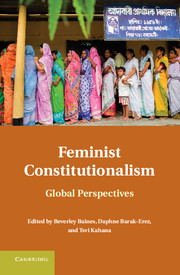Book contents
- Frontmatter
- Contents
- Foreword
- Contributors
- Introduction
- Part I Feminism as a Challenge to Constitutional Theory
- Part II Feminism and Judging
- 4 Her-meneutics
- 5 Intuition and Feminist Constitutionalism
- 6 Women Judges, “Maiden Speeches,” and the High Court of Australia
- 7 Will “Watertight Compartments” Sink Women's Charter Rights? The Need for a New Theoretical Approach to Women's Multiple Rights Claims under the Canadian Charter of Rights and Freedoms
- 8 Constitutional Adjudication and Substantive Gender Equality in Hong Kong
- Part III Feminism, Democracy, and Political Participation
- Part IV The Constitutionalism of Reproductive Rights
- Part V Women's Rights, Multiculturalism, and Diversity
- Part VI Women between Secularism and Religion
- Index
- References
8 - Constitutional Adjudication and Substantive Gender Equality in Hong Kong
Published online by Cambridge University Press: 05 June 2012
- Frontmatter
- Contents
- Foreword
- Contributors
- Introduction
- Part I Feminism as a Challenge to Constitutional Theory
- Part II Feminism and Judging
- 4 Her-meneutics
- 5 Intuition and Feminist Constitutionalism
- 6 Women Judges, “Maiden Speeches,” and the High Court of Australia
- 7 Will “Watertight Compartments” Sink Women's Charter Rights? The Need for a New Theoretical Approach to Women's Multiple Rights Claims under the Canadian Charter of Rights and Freedoms
- 8 Constitutional Adjudication and Substantive Gender Equality in Hong Kong
- Part III Feminism, Democracy, and Political Participation
- Part IV The Constitutionalism of Reproductive Rights
- Part V Women's Rights, Multiculturalism, and Diversity
- Part VI Women between Secularism and Religion
- Index
- References
Summary
This chapter considers the constitutional right to equality and nondiscrimination as it has developed in Hong Kong and the extent to which it promotes substantive gender equality. Hong Kong provides an interesting comparative study for an examination of feminist constitutionalism given its unique status as a special administrative region (SAR) within China, the world's most populous and arguably most quickly developing nation. Hong Kong's constitutional document, the Basic Law, grants the territory a high degree of autonomy, and its common law system and judicial independence have generally survived since the transfer to Chinese sovereignty in 1997. With some exceptions, human rights are well protected and Hong Kong's role as a financial center has bolstered its influence. In the field of equality law, Hong Kong's increasingly robust judicial interpretation of a constitutional right to equality coupled with its growing body of antidiscrimination legislation highlight its potential to set an example within Asia. This experience also contributes to a better understanding of the potential – and the limits – of international human rights law for furthering gender equality at the domestic level.
This chapter examines several Hong Kong judgments that interpret the right to equality expressed in Article 25 of the Basic Law and relevant provisions of the Bill of Rights, which essentially duplicates the 1966 International Covenant on Civil and Political Rights (ICCPR). The courts have also relied on legislation that prohibits direct and indirect discrimination in both the public and private sectors on the grounds of sex, marital status, pregnancy, and family status.
- Type
- Chapter
- Information
- Feminist ConstitutionalismGlobal Perspectives, pp. 149 - 166Publisher: Cambridge University PressPrint publication year: 2012

